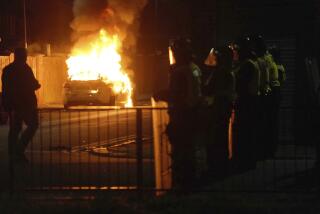Moscow Police Attack Angry African Students : Russia: Shooting death of Zimbabwean and officers’ assault, protesters say, are evidence of systematic abuse.
- Share via
MOSCOW — African students at Russia’s University of Friendship of Peoples were severely beaten by riot police Wednesday during a demonstration protesting the slaying of a student from Zimbabwe by a Russian policeman.
The killing of the 25-year-old history student and the attack on peaceful demonstrators by baton-wielding, helmeted police were proof, the students say, of the systematic abuse they face in Moscow because of their skin color.
One policeman yelled out, “I will kill you, swine!” as about two dozen police in riot gear and several plainclothesmen were seen attacking the demonstrators. They were marching down the street carrying hand-printed signs with sayings such as “We Need Police Protection, Not Police Murderers.”
The policemen chased the fleeing students and surrounded several of them, then began kicking them in the groin and beating them with fists and rubber truncheons. Several of the policemen were seen laughing.
“It’s pure racism,” said Lateef Ogboye, 33, a student from Nigeria. “These so-called policemen treat us like scum. These brutal police beatings are daily occurrences in our campus life. You are damn lucky if you manage to get away with just being called a black bastard or some other dirty name.”
Police officers said the students provoked the attack by interrupting traffic with their march.
Students said they were trying to draw attention to the killing of Gideon Chimusoro. They fear that the policeman who shot him will not be brought to justice, they say, because Russian authorities are deeply prejudiced and will not believe Africans’ version of the killing.
Witnesses to the shooting recounted the following chain of events:
Five students from Zimbabwe were sitting at a picnic table Tuesday evening drinking beer and vodka to celebrate Heroes Day, which honors people who died in their country’s struggle for independence. A policeman and a friend were sitting at a nearby table drinking vodka when the friend’s dog tried to bite one of the Zimbabweans, Brave Rusike.
When Rusike kicked at the dog to shoo him away, the owner approached him and an argument ensued.
“Then the policeman came up and punched my friend (Rusike) in the face and put a gun at my friend’s chest,” Anthony Phisi, 25, one of the Zimbabweans at the table, said later.
By this time, the other four had jumped to their feet, and the officer swung his gun threateningly and said, “Don’t move or I’ll shoot!”
Rusike ran for cover behind a nearby tree.
“Then he shot Gideon right in the neck,” Phisi continued. “He was shocked when he realized what he had done, and he ran to help Gideon . . . but when he saw that the damage was done, he collected the cartridge and left.”
As Chimusoro lay motionless, dying, a riot erupted around him.
Students who heard the shot ran to see what had happened and became enraged.
“We were terrorized by it all,” said Samuel Abem, 30, a mechanical engineering student from Ghana who was sitting nearby when the shooting occurred. “We started shouting things . . . and curses in all different languages, and whistling and breaking bottles.”
Police fired into the air to disperse the crowd, but the students began stoning a police car containing the officer who had fired the gun. They also set fire to at least one kiosk, according to eyewitnesses and police reports.
It took more than an hour for an ambulance to reach the scene; by that time, Chimusoro was dead.
Russian media coverage of the killing and the riot that followed appeared aimed at vindicating the police and clearly implied that the black students were guilty. Television reports said the incident “resembled TV reports on the Los Angeles riots,” specified that the policeman was “defending himself” and referred to the protest as “mass hooliganism” of “a fierce multinational mob of students.”
Although news cameramen were present as police beat the students Wednesday, the nightly news showed no violence and accused the students of provoking the police.
The announcer ended the account by stating that the African students “promise to shoot down all of us tomorrow.”
No Russian reporters bothered to contact the Zimbabwean Embassy to get the other side of the story, according to a diplomat.
The Zimbabwean Embassy issued a press release that echoed the version of events given by the witnesses and stated that the prosecutor’s office had issued a preliminary report accusing the officer of acting “against the law by shooting at Chimusoro.”
The officer, a member of the university police force, is also a law student at the university and a veteran of the war in Afghanistan, according to Nikolai N. Trofimov, the university’s president.
Criminal charges of abuse of authority will be filed, according to the report. Punishment for this crime is two years of hard labor, three years in prison or loss of a job.
The students stressed the irony of discrimination at a university that was founded by Soviet authorities to train a cadre of young people from developing countries who would return to their homes and spread the ideals of communism there.
“When I came here, I thought that I would live well here, but instead I am treated like a criminal and outcast,” said Abu Bakar Mamman, 22, an agricultural science student from Niger. “Yes, I am treated as a student in classrooms; but outside, especially in the dormitory, I am treated like a criminal. . . . What kind of friendship will I learn from this friendship university?”
Sergei Loiko, a researcher in The Times’ Moscow Bureau, contributed to this article.
More to Read
Sign up for Essential California
The most important California stories and recommendations in your inbox every morning.
You may occasionally receive promotional content from the Los Angeles Times.













